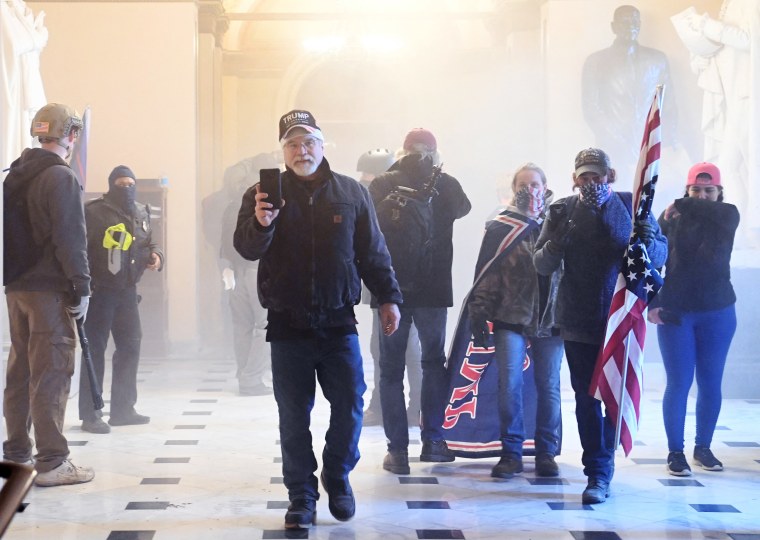WASHINGTON — A federal appeals court panel has affirmed the government's use of an obstruction charge used against hundreds of defendants arrested in connection with the Jan. 6 attack on the U.S. Capitol, though the complex opinion appears likely to result in additional litigation and leaves questions about the future of the use of the statute.
A three-judge panel, on a 2-1 vote, upheld the use of the obstruction of an official proceeding charge against defendants who assaulted law enforcement during the Capitol attack. A lower court judge, Trump appointee U.S. District Court Judge Carl Nichols, had previously tossed the charge, a decision the appeals court reversed.
"The question raised in this case is whether individuals who allegedly assaulted law enforcement officers while participating in the Capitol riot can be charged with corruptly obstructing, influencing, or impeding an official proceeding, in violation of 18 U.S.C. § 1512(c)(2)," the opinion stated.
Nichols' ruling "held that the statute does not apply to assaultive conduct, committed in furtherance of an attempt to stop Congress from performing a constitutionally required duty. We disagree and reverse," Friday's opinion said.
The opinion was written by U.S. Court of Appeals for the District of Columbia Circuit Judge Florence Y. Pan, a Biden appointee, and joined in part by Justin R. Walker, a Trump appointee who was just 38 when he became the youngest judge to sit on the powerful appellate court in several decades, after serving less than a year as a federal judge in Kentucky. Judge Gregory G. Katsas, who served as Trump's deputy White House Counsel for the first year of his presidency, dissented.
Walker, in his concurrence, said that the government “must show that the Defendants ‘corruptly’ obstructed the certification of the Electoral College vote” and that it wasn’t “outside the realm of possibility” that prosecutors could do so.
“For example, it might be enough for the Government to prove that a defendant used illegal means (like assaulting police officers) with the intent to procure a benefit (the presidency) for another person (Donald Trump),” Walker wrote.
The case is likely to result in further litigation. More than 308 defendants have faced the obstruction charge, according to the U.S. Attorney's Office. The Jan. 6 participants could ask the entire appeals court to review the statute’s use against Capitol riot defendants (though such en banc hears are rare), and potentially bring the case to the U.S. Supreme Court.
Some legal commentators have suggested that Jack Smith, the special counsel investigating Trump, could bring obstruction of an official proceeding charges against Trump himself.
The chief named appellant in the case is Joseph Fischer, a former police officer who, the government says, joined the Capitol attack on Jan. 6, where he had a physical encounter with another officer and urged rioters to “charge” and “hold the line." Fischer wanted to go “to war" and "Take democratic [C]ongress to the gallows" if Trump didn't get into office for a second term, the government said. "Can’t vote if they can’t breathe . . . lol,” he allegedly texted.
(There are two former police officers with similar names — Joseph Fischer and Joseph Fisher — who were arrested in connection with the Jan. 6 attack. This case involves the Joseph Fischer of Pennsylvania, who was initially arrested in 2021. The second man, Joseph Fisher, is a former Boston Police K-9 officer who was arrested last month, and is also charged with assaulting an officer, according to the government and video evidence.)
The obstruction charge carries a maximum sentence of 20 years, although no Jan. 6 defendant has been sentenced to that long, so far. The longest Jan. 6 sentence to date — 10 years in federal prison — went to Thomas Webster, a former New York City Police Department officer who assaulted a D.C. police officer on Jan. 6, and then lied about his conduct on the stand.
About 1,000 cases have been brought against Jan. 6 defendants in the more than two years since the Capitol attack. Online sleuths have successfully identified hundreds of additional rioters who have not yet been charged, including more than 100 whose photos are featured on the FBI's website. The total number of people who could be charged for their conduct is around 3,000, and the Justice Department has indicated to the court that roughly 1,000 cases could be in the pipeline.

